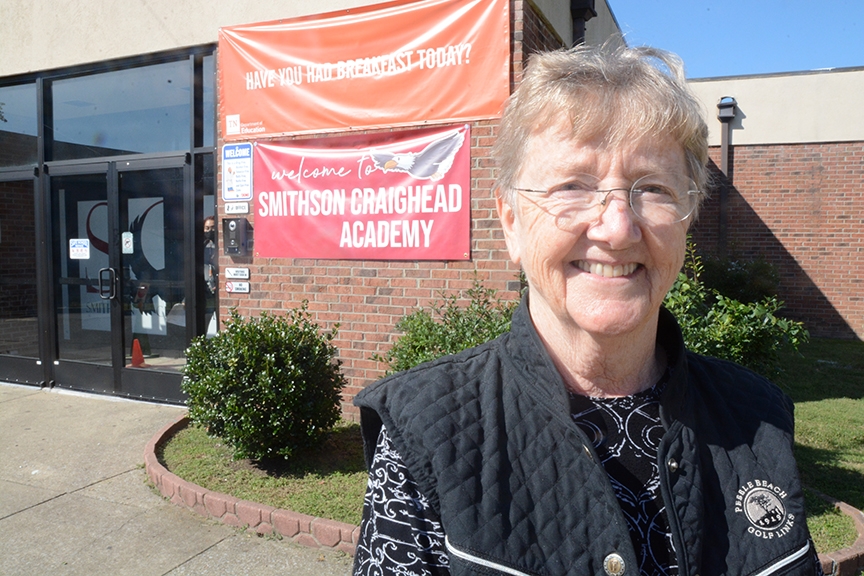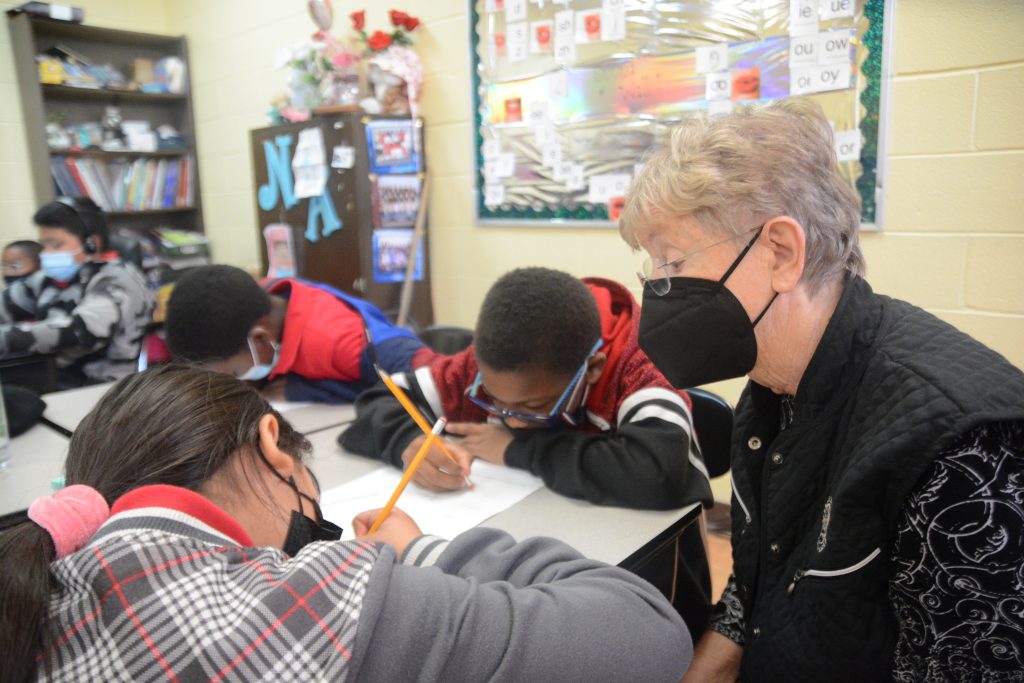
Sister Marianne Poole, 79, holds up a portrait of St. Katharine Drexel. In it, the saint stands with a Native American and an African-American with a map of the United States in the background.
It’s a special image she is using to share her story as a member of the Sisters of the Blessed Sacrament founded by America’s first native-born saint.
“You always feel it’s a path, what is God calling you to?” Sister Marianne said, “and you listen. So, I listened and I’ve been totally blessed. It’s been 60 years of, I have to admit, a good time. I’ve met wonderful people. I’ve had an experience of going all over the world.”
Sister Marianne’s journey as an educator has taken her through inner-city schools in New Orleans, Philadelphia, Cleveland, Washington, D.C., Harlem, and Santa Fe, New Mexico. She’s visited the Caribbean and the Baltics, Greece and Italy.
She came to Nashville about 10 years ago to work with Sister Sandra Smithson at Smithson Craighead Academy, the free public charter school in Madison serving low-income, mostly minority students.
“It’s a delight,” she said of her work as a tutor at the school. “I get a chance to work with the children, help them, listen to them. You know, the whole idea is that you’re there for them.”
“I’m very spoiled here. Sister Sandra said the Sisters of the Blessed Sacrament took care of her from 6 years old so she has been so generous with the congregation,” she said. “She says it’s a blessing for her, but it’s really a blessing for me.”
The establishment of schools to serve poor minority communities is a hallmark of the religious order, which today counts seven schools in three states and 24 parishes in 18 states bearing St. Katherine Drexel’s name, according to Sister Marianne, who is a native of Philadelphia.
She recalled when she was in the eighth grade, “Mother Katherine (Drexel) died and it was a big story,” she said.
It was March 3, 1955, and the story was of a woman born to wealth who felt called by God to serve the Native American and Black races, especially through education.
Growing up in Philadelphia, St. Katharine’s family helped the poor in their neighborhood. It laid the foundation for her encounter in 1887 with Pope Leo XIII. She came to Rome to ask him to send missionary priests to America; he asked her to become a missionary.
She formed her religious community in 1891, pronouncing vows as its first member and foundress, according to a summary by Stephanie Morris, director of archives for the religious order.
St. Katharine and her order established schools across the country, including Xavier University in New Orleans and the former St. Vincent de Paul School and Immaculate Mother Academy in Nashville.

“I remember my girlfriend and I had this conversation. I thought she was wonderful. My girlfriend says, ‘Hey, she did what she wanted to do.’ I said, ‘She was a millionaire, she gave it all up for God.’”
Sister Marianne and her friend visited the Sisters of the Blessed Sacrament. “I wound up a Sister of the Blessed Sacrament because I was so enthralled with the diversity of the congregation, with the commitment, with the warmth and joy – so they had me!”
“It was that little nagging feeling that this is what I would like to do. And of course, when we visited Mother Anselm at the Motherhouse, she said, ‘Well, you know there is a trial period.’”
In 1961, after working a year in the private sector at the request of her mother, Sister Marianne took her first steps into the novitiate of religious life. She professed her final vows in 1964.
She said one of the great highlights of her life was being in Rome for the canonization of St. Katherine on October 1, 2000.
“Oh, that was so powerful,” she said, recalling that a benefactor in Philadelphia paid for any Sister of the Blessed Sacrament to attend the event.
In Rome, “You walked around and you met people that you worked with in New Orleans, in Philadelphia, in Cleveland; people from Xavier University, and everybody was associated with her. So, there was this camaraderie around her and her mission and spirit.”
The Sisters also were the featured guests at a Mass at the papal Basilica of St. Paul Outside the Walls. “We came in in a procession, all of us, and the people stood up and clapped. It was touching, it was wonderful.”
In his homily that day, Pope John Paul II spoke of the canonization of 123 new saints: Mother Katherine Drexel of Philadelphia; Augustine Rong and his 119 companions, martyrs in China; St. Maria Josefa of the Heart of Jesus, the Basque founder of the Servants of Jesus of Charity; and Josephine Bakhita, a Canossian Daughter of Charity who became the patron of the African nation of Sudan.
Of Mother Katharine, the Pope said: “With great courage and confidence in God’s grace, she chose to give not just her fortune but her whole life totally to the Lord … she taught a spirituality based on prayerful union with the Eucharistic Lord and zealous service of the poor and the victims of racial discrimination.
“Her apostolate helped to bring about a growing awareness of the need to combat all forms of racism through education and social services. Katharine Drexel is an excellent example of that practical charity and generous solidarity with the less fortunate which has long been the distinguishing mark of American Catholics.”
Sister Marianne, accompanied by her sister and brother-in-law, had a front row seat with a perfect view of the canonization activities. “You had all kinds of people there … the diversity, the inclusion,” she said. “The pope, he was so gracious, he just watched.
“It was just so big and yet you felt a part of it. That was wonderful, that was an experience you don’t forget.”
This past September, Sister Marianne celebrated her milestone anniversary with fellow roommates and coworkers, Sister Sandra and Sister Mary Acerbi, both of whom are of the School Sisters of St. Francis.
Though from different religious communities, they say their hope is for greater awareness of St. Katharine Drexel’s mission. They share a camaraderie that Sister Marianne says drew her into religious life it seems only yesterday.
“What’s ahead?” she laughed with a happy smile. “I’m not allowed to leave here! The (Blessed Sacrament) congregation, they’re very grateful that I have such a wonderful community here that supports me, and as long as I can be part of these children’s lives, I want to be.”









